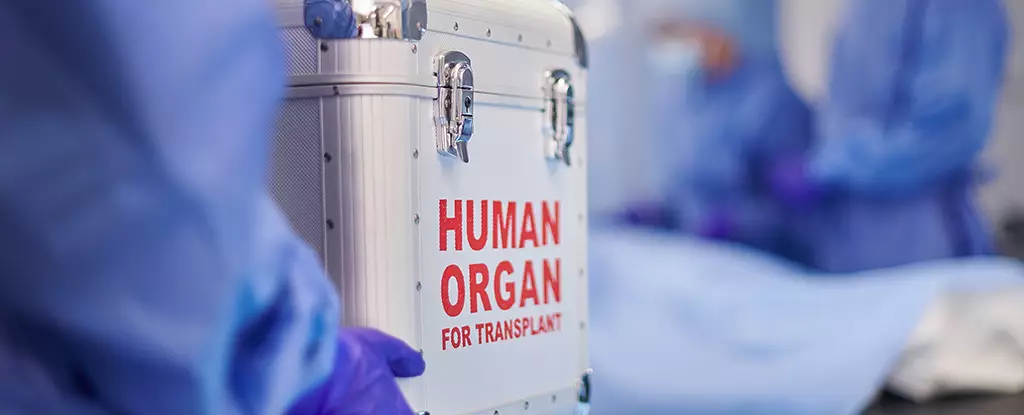A deeply unsettling incident in Kentucky has sparked significant concern regarding the protocols and practices surrounding organ donation in the United States. At the heart of the matter is the case of Anthony Thomas “TJ” Hoover II, a 36-year-old man who awoke during what was meant to be a routine organ harvest. This harrowing event has opened a Pandora’s box of ethical questions about how medical professionals determine death and the processes that govern organ procurement.
On a fateful day in October 2021, TJ was admitted to Baptist Health Hospital following a drug overdose. After being declared brain dead due to cardiac arrest, he was prepared for organ donation, a decision supported by his family. However, as hospital staff attempted to proceed with the organ harvest, they were confronted by an alarming reality: the patient exhibited signs of life and appeared to be reacting during the procedure. Nyckoletta Martin, an organ preservationist working for Kentucky Organ Donor Affiliates (KODA), provided revelation about this incident in testimony to the U.S. House of Representatives’ Energy and Commerce Committee.
Martin’s claims highlight the distressing moment when TJ reportedly opened his eyes and exhibited movements that suggested consciousness. These developments raised immediate concerns among the medical team, leading to the procedure’s abrupt cancellation. The abruptness of the situation not only alarmed healthcare professionals but left TJ’s family grappling with the surreal experience of witnessing what they initially believed to be mere reflex actions.
The chaotic nature of the incident unraveled as healthcare providers faced the implications of resuming an operation that could have led to irreversible harm. In commentary to NPR, Natasha Miller, another organ preservationist, recalled the uncertainty and fear that flowed through the operating room. The responsible surgeon stepped away from the procedure out of concern, illustrating the gravity of the incident. Reports indicate that while there was an immediate call for another physician to assess the situation, it remains contested by KODA, raising a critical question about the accountability and communication within medical teams during high-stakes operations.
While it is fortunate that TJ survived, the path toward recovery has been filled with challenges. As indicated in reports, he suffers from ongoing issues concerning speech, memory, and movement, highlighting the profound impact such traumatic experiences can have on a patient’s life post-event.
This incident provokes a much broader conversation about the adequacy of current protocols regarding organ donation in the United States. Healthcare professionals balance a precarious act; the criteria for declaring brain death must be stringent enough to avoid errors. Errors of any kind can lead not only to the loss of potential donor organs but also to catastrophic psychological consequences for patients and families involved in an organ donation process.
Former organ preservationist Martin articulated the chilling implications that such incidents hold for public trust. If cases like TJ’s become more common, they could warp the public’s perception of organ donation, creating apprehension around a system that is intended to save lives.
The current landscape of organ transplantation in America is fraught with complexities. While over 46,000 transplants occur annually, more than 100,000 individuals are on waiting lists, underscoring a stark imbalance in supply and demand. The recent case of TJ Hoover serves as a clarion call for reforming policies across the organ donation and transplantation sectors. Better training, clearer communication protocols, and heightened scrutiny of medical guidelines are essential to ensure not only the safety of prospective organ donors but also the trustworthiness of the entire medical establishment.
Baptist Health Richmond, in light of these events, emphasized the paramount importance of patient safety, echoing sentiments directed at the Health Resources and Services Administration, which is currently investigating the case. With growing public scrutiny, it is crucial for the medical community to transparently address concerns raised by incidents like TJ’s and to actively pursue improvements to prevent them.
The haunting experience of Anthony Thomas “TJ” Hoover II serves as a profound reminder of the critical need for reevaluation within the organ donation protocols. As investigations unfold, it is imperative that the medical community collaborates to build a framework founded on ethical responsibility, informed decision-making, and unwavering respect for the sanctity of life. For both the families affected by similar incidents and the patients waiting for transplants, the integrity of the healthcare system must be upheld in order to foster faith in a service that aims to not only preserve but truly honor life.


Leave a Reply